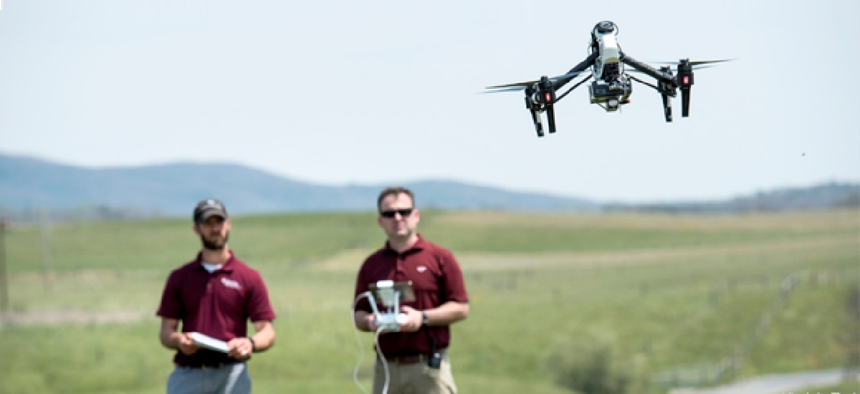
Connecting state and local government leaders
Alphabet and Virginia Tech are teaming up to test food delivery at the Blacksburg campus, home of one of the six Federal Aviation Administration designated test sites.
One burrito with white rice, black beans and chicken. Delivery option: By drone.
Drone delivery could be a reality for some volunteer Chipotle customers in Blacksburg as the Virginia Tech Mid-Atlantic Aviation Partnership (MAAP) teams up with Alphabet’s Project Wing to test food delivery using unmanned aerial systems. Virginia Tech is one of six Federal Aviation Administration designated test sites for UAS, and this is the first time Project Wing has worked with one of the sites, according to a university statement.
“Last year while discussing the entrepreneurial spirit at Virginia Tech, I jokingly speculated we might one day have quadcopters delivering ramen noodles around campus -- apparently I wasn’t off by much,” Virginia Tech President Tim Sands said.
Those involved with the project say food is a good case study for drones because of the variables required to get it right: timing, packaging and repeatability.
“Package delivery by drone, especially for rapid turnaround operations like food delivery, is one of the most challenging applications of this technology,” MAAP Director Mark Blanks said in the university’s announcement. The research will address many of the policy and safety issues the FAA and industry is wrestling with: beyond-line-of-sight operations, flight over densely populated areas and coordination with other aircraft.
Project Wing is a Google[X] program working on the delivery of everyday goods by small unmanned aircraft in an effort to open up a new commerce system that could be more efficient than ground transportation.
The current phase of the project is not open to the public, but later this month some customers could expect a burrito to be lowered by a winch attached to a hovering drone, according to Bloomberg.
Project Wing lead Dave Vos said the knowledge gathered through testing with Virginia Tech will be an important part of moving drones into regular use, echoing his comments in August at a White House UAS event.
“Our collaboration will generate new data on the operation of a delivery system and aircraft and will help gather insights about how people might use an aerial delivery system in their daily lives,” Vos said in a statement.
This testing will only last a few weeks, according to Bloomberg. So it’s not known when drone-delivered burritos will become a mainstay on Virginia Tech’s campus, or other locations around the country. But people are hopeful it's right around the corner.
MAAP has been a leader in UAS testing. In July 2015, a full-sized aircraft remotely operated by NASA’s Langley Research Center flew medical supplies from Tazewell County in southwest Virginia to the Lonesome Pine Airport in Wise County, Va. From there, staff from the drone company Flirtey separated the supplies into 24 small packages and delivered them to the local free clinic through repeated flights over the span of two hours.
Virginia politicians, who have been vocal about their support for UAS research in the past, have praised this project as well.
“The commercial use of drones for package and food delivery in U.S. airspace is rapidly becoming a reality,” U.S. Sen. Mark R. Warner (D-Va.), said in a statement. “We are pleased to work with Project Wing and other great partners to leverage Virginia Tech’s tremendous research capacity to capitalize on the tremendous business potential promised by unmanned aircraft systems technology.”
NEXT STORY: DARPA targets doctored images





